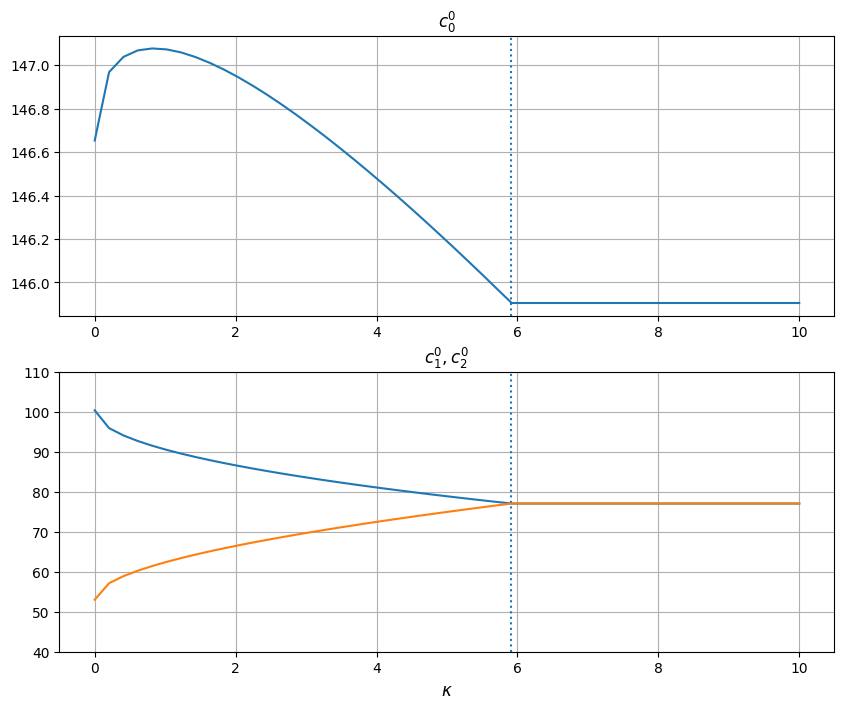Contract plots#
This notebook explores how the terms of renegotiation-proof contracts change with parameters.
import Contract
import numpy as np
import matplotlib.pyplot as plt
from ipywidgets import interact,fixed
plt.rcParams['figure.figsize'] = 10, 8
np.set_printoptions(precision=2)
def plot_ckap(beta=0.6, rho=0.8, y0 = 100, comp = True):
if comp:
C = Contract.Competitive(beta=beta)
else:
C = Contract.Monopoly(beta=beta)
num = 50
C.rho = rho
kk = np.linspace(0, 10, num)
C.y = np.array([y0, (300-y0)/2, (300-y0)/2])
c = np.zeros(shape=(num,3)) # last column for profits or utility
fig, ax = plt.subplots(2,1)
for i, k in enumerate(kk):
C.kappa = k
c[i] = C.reneg_proof()
ax[0].axvline(C.kbar(), linestyle=':')
ax[1].axvline(C.kbar(), linestyle=':')
ax[0].plot(kk, c[:,0])
ax[1].plot(kk, c[:,1:3])
#ax[0].set_ylim(110,160)
ax[1].set_ylim(40,110)
ax[0].set_title(r'$c_0^0$')
ax[1].set_title(r'$c_1^0, c_2^0$')
ax[1].set_xlabel(r'$\kappa$', fontsize=12)
ax[0].grid(), ax[1].grid()
Note that the first of the subplots for \(c_0^0\) is set to autoscale, while the others are on a fixed scale.
plot_ckap(beta=0.6, rho=0.8, y0 = 100, comp = True)

Interactive Plot#
In order for the widget sliders to affect the chart you must be running this on a jupyter notebooks server. If you are viewing this on the web, click on the Rocket icon button above to launch a cloud server service (Binder, or google colab).
interact(plot_ckap, beta=(0.4, 0.95, 0.05), rho = (0.4,2, 0.11), y0=(20,200,10));
Compare \(c_0^F\) to \(c_0^P\)#
Proposition 2 of the paper describes how period 0 consumption changes depending on how tightly the no-renegotiation constraint binds. As argued, for the competitive contract case, (when \(\kappa = 0\)) there will be a \(rho>1\) above which period 0 consumption rises (i.e. it becomes optimal to borrow less, save more compared to the first best).
def zero_cons_plot(b):
num = 50
for i, rh in enumerate(np.linspace(0.2,2,50)):
plt.scatter(rh, 300/(1+b+b**(1/rh)), color='k' )
plt.scatter(rh, 300/(1+2*b**(1/rh)) )
plt.xlabel(r'$\rho$')
Comparing \(c_0\) renegotiation proof (kappa=0, so as if renegotiated; black line) to efficient (color line).
But note that effects are small
interact(zero_cons_plot, b=(0.1,0.95, 0.05));


